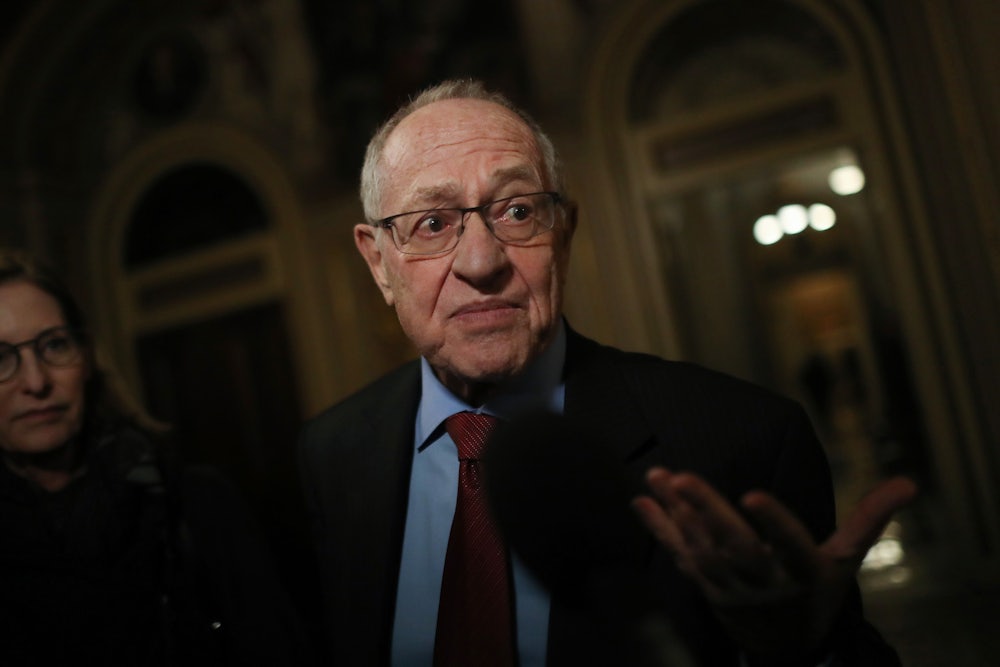For the Senate’s first day of questioning on Wednesday, President Donald Trump’s legal team tapped Patrick Philbin to answer most of the questions. Philbin, a deputy White House counsel, largely gave concise and sober answers to the senators’ queries. It was a refreshing change from the likes of Jay Sekulow, who addresses the chamber as if it were a Fox News studio, and Pam Bondi, a former Florida attorney general and awkward Trump donation recipient, whose sole apparent role in these proceedings was to smear Joe Biden.
And then there was Alan Dershowitz. The controversial Harvard University law professor emeritus rose to answer a fairly straightforward inquiry from Texas Senator Ted Cruz, the only member of Trump’s ostensible jury who also hosts an impeachment-themed podcast, The Verdict With Ted Cruz: Does it matter legally whether there was a quid pro quo, since quids pro quo are a common feature of foreign relations? Dershowitz took the question and ran with it, outlining a view of executive power that hovers somewhere between authoritarian and monarchical.
Cruz’s question conflated normal diplomatic bargaining, where two countries seek things from each other to advance their respective national interests, with corruption. The distinction should be common sense. It’s the difference between President John F. Kennedy agreeing to withdraw America’s Jupiter missiles from Turkey if the Soviets do the same in Cuba, in 1963, and Kennedy refusing to lift the Caribbean blockade unless Soviet leader Nikita Khrushchev publicly declares that the Republican candidate for president is a Communist during the 1964 elections.
In theory, the president’s personal interests should be strictly defined by the public interest. If he carries out foreign policy in a way that improves Americans’ lives, for instance by negotiating a trade deal or brokering a peace treaty, he’ll be more likely to receive those Americans’ votes for reelection. But Dershowitz inverts this basic democratic formula so he can exculpate Trump of wrongdoing. In his view, presidents can’t be impeached for pursuing their personal interests through American foreign policy so long as they hold the subjective belief that those personal interests are, in fact, the national interest.
“Every public official that I know believes that his election is in the public interest, and mostly you’re right,” he told senators. “Your election is in the public interest, and if a president does something which he believes will help him get elected in the public interest, that cannot be the kind of quid pro quo that results in impeachment.” In Dershowitz’s formulation, senators are not permitted the discretion to identify what’s in the president’s personal interest and what’s in the public interest. The president, he argues, gets to decide when what’s good for him is good for everyone else. Abuse of power is determined by the abuser of power.
Accordingly, Dershowitz said on Wednesday that Trump could be impeached if he told Ukraine he wouldn’t release the funds unless they gave him a million dollars. “That’s an easy case,” he told senators. “That’s purely corrupt and in the purely private interest. But a complex middle case is, ‘I want to be elected. I think I’m a great president. I think I’m the greatest president there ever was. If I’m not elected the national interest will suffer greatly.’ That cannot be impeachable.”
Absurdism is a staple of Dershowitzian argumentation when it comes to protecting Trump from impeachment. By his legal standard, any presidential act that isn’t an explicit federal crime, such as bribery or murder, is beyond Congress’s power to check through impeachment. As I noted last week, Dershowitz asserted in 2018 that his bespoke interpretation of the Constitution’s provisions on impeachment would leave Congress powerless to remove Trump from office even if he allowed Russian President Vladimir Putin to invade and annex Alaska.
The good news is that Americans aren’t twisting themselves into pretzels to clear the president. A recent Quinnipiac University poll found that a majority of voters think Trump abused his power in the Ukraine scandal, suggesting that—at the very least—they believe the president can abuse power and be held accountable. The bad news is that the Republican-led Senate seems headed toward the opposite conclusion. Speaking to reporters after Dershowitz answered his question, Cruz called his performance “powerful” and declared the attorney had “rightly pointed out that we engage in quid pro quos all the time.” So much for the public interest.
